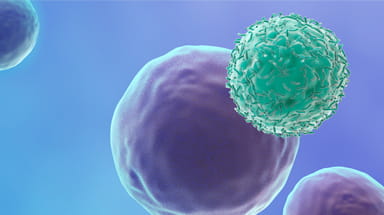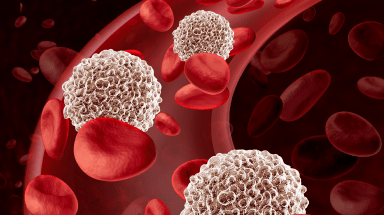FDA-Approved Therapy
UPMC Hillman Cancer Center currently offers all FDA-approved CAR T-cell therapies.
Learn MoreExplore this Section
Chimeric antigen receptor (CAR) T-cell therapy uses a person's own T cells to find and kill cancer cells.
UPMC Hillman Cancer Center was one of the first centers in the U.S. to offer CAR T-cell immunotherapy.
UPMC also tests new forms of this cutting-edge cancer treatment through clinical trials.
To learn if a CAR-T cell clinical trial is right for you, call 1-833-876-2227.
A T cell is a type of white blood cell that fights infection and disease. When a T cell sees a threat — like a virus-infected cell — it kills that cell to protect the body.
The goal of CAR T-cell therapy is to make T cells attack cancer cells instead of just infected cells.
First, doctors harvest a person's T cells and send them to a special lab. The lab genetically alters the cells to spot a certain protein in cancer cells. They then grow large numbers of the altered T cells.
After a few weeks in the lab, the CAR T cells will be ready for infusion.
Once the CAR T cells return to UPMC, our team puts them back into the person. The CAR T cells then attack and kill cancer cells as they were “trained."
Doctors use CAR T-cell therapy to treat certain blood cancers that haven't responded to other treatments.
So, if you have blood cancer, your doctor will first treat you with standard chemo- or immunotherapies.
Then, if the U.S. FDA has approved a CAR T-cell therapy for your cancer, your doctor may try that.
Expect to stay in the hospital for up to two weeks after your infusion. Your care team will watch you closely during this time.
The FDA has set strict limits on who can get CAR T-Cell therapies and when.
UPMC Hillman Cancer Center offers the full range of FDA-approved CAR T-cell therapies, which are often effective against certain types of:
You must know that CAR T-cell therapy can also cause severe or life-threatening side effects.
CRS is CAR T-cell therapy's most common and possibly severe side effect.
After doctors put CAR T cells back into the body, they can release proteins called cytokines. Once they reach the bloodstream, the proteins can overstimulate the immune system.
CRS symptoms include:
Most people who receive CAR T-cell therapy will get mild CRS. The danger is when CRS is severe. Prompt, expert treatment is vital.
CAR T-cell therapy can also cause problems in the nervous system, such as:
You may not be able to drive or use heavy machinery for a few weeks after CAR-T cell treatment.
After treatment, you may also have other side effects, such as:
CAR T-cell therapy is challenging to provide, so few hospitals can offer this potentially lifesaving treatment.
UPMC Hillman Cancer Center:
To refer a patient for evaluation for one of these clinical trials, please call 1-833-876-2227.
If you think you might be a candidate for one of these clinical trials, please call 1-833-876-2227.

FDA-Approved Therapy
UPMC Hillman Cancer Center currently offers all FDA-approved CAR T-cell therapies.
Learn More
Research and Clinical Trials
UPMC Hillman Cancer Center is currently enrolling patients in CAR T-cell therapy clinical trials.
Learn More